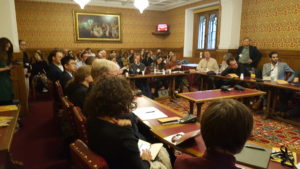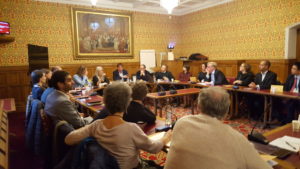
In an age of media soundbites and Twitter rants, of public distrust and alternative facts, have we forgotten how to have a constructive political debate? Has it become all too easy to slip into sectarian assertions and trading insults, rather than using evidence and well-reasoned arguments to persuade?
In short, does our politics suffer from a crisis of rhetoric? And if so, what can we do to fix things?
These are the questions that a research network led by Dr Henriette van der Blom (University of Birmingham) and Professor Alan Finlayson (UEA) have been trying to address.
Their project entitled ‘The Crisis of Rhetoric: Renewing Political Speech and Speechwriting’ brought together academics, politicians, speechwriters and political journalists to consider the challenges faced in the UK today and how ancient and modern ideas about rhetoric could contribute to the quality of political speech and argument today.
Out of these discussions, the Crisis of Rhetoric team produced a short guide recommending innovative new methods in speechwriting and speechmaking practice, and ways for journalists to present political debate. This was officially launched at a packed meeting in the House of Lords this month, featuring guest contributions from journalist Philip Collins and classicist Professor Mary Beard.
According to Collins, who once worked as Tony Blair’s speechwriter, politicians are often tempted by close media scrutiny to make bland statements, filled with clichés and “prefabricated phrases”. When you also consider that ministers are speaking more often – sometimes three times a week – it’s little wonder that many speeches come across as “very, very dull.”
Professor Beard raised concerns over the “obvious gap” between the writers and speakers, saying she often doesn’t feel that politicians are speaking to her, but are instead, “reading out, either well or badly, a speech that has not been written by them.”
Launch event gallery
The report: key points on speechwriting and delivery
- Keep the style of language appropriate to the particular time and topic. Sometimes ‘ordinariness’ is needed, but that will feel inept and inauthentic when thoughtfulness and leadership are expected.
- Be aware of the character you are playing or writing. When people speak in public – at a wedding, a prize giving, a training event – they play a part in a collective occasion; they have to be not only themselves but also who the audience need them to be.
- Be aware of the part the audience is playing. Political decisions are not only about what government does to, or for people. They also concern things we will do together, for ourselves and each other. To be convinced, people need to see themselves, their own character, in the argument: who they are now and who they might become.
- Be prepared, when necessary, to be bold and take the risk of speaking openly about what you think and feel.
- Always remember that political speeches are arguments, not ‘presentations’ or ‘advertising’.
- Have a good sense not only of what people think (according to opinion polls) but of how we think. What are the general ideas, outlooks and values that people share and that lie behind the polls and focus groups?
- Consider ways of developing arguments over time, across speeches and not just using them for single occasions; it can take time to persuade people of something and politicians need to make time to do it. Great politicians and great political movements change the common beliefs and prejudices of a community – that is how political history is made.
Find out more
Listen to the presentations at the Crisis of Rhetoric launch (audio / transcript)
Click here to download a copy of the Crisis of Rhetoric report.
Visit the Network of Oratory and Politics website.



